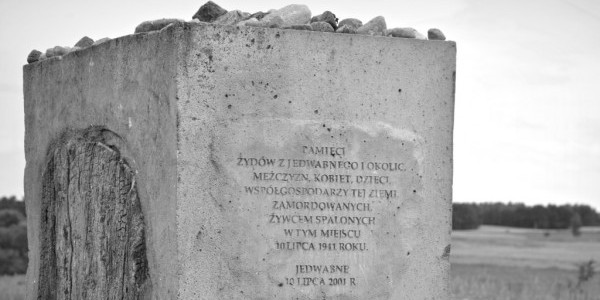Jews massacred in Jedwabne pogrom
10/07/2022 | Na stronie od 11/07/2022

Source: World Jewish Congress
On 10 July 1941, hundreds of Jewish men, women, and children were massacred by local Poles in the town of Jedwabne.
Prior to the Holocaust, Jews made up between 60 and 70 percent of the overall population of some 2,000 in Jedwabne. The town was situated in an area that was a hotbed of the antisemitic National Democratic Party (Endecja). After the German-Soviet invasion of Poland, Jedwabne was taken by the Soviets.
Shortly after the Soviets retreated, Polish townspeople rounded up hundreds of their Jewish neighbors and forced them to dismantle a monument of Vladimir Lenin that the Soviets had installed. From there the Jews were forced into a barn, where they were burned to death.
Years later, Polish-American scholar Jan Gross published a controversial account of the pogrom entitled Neighbors: The Destruction of the Jewish community in Jedwabne, Poland, which revealed that while Germans allowed the pogrom to occur, it was the Polish townspeople who murdered their Jewish neighbors.
On 19 December 2001, officials at Poland's Institute of National Memory (IPN) announced that its three-year investigation into the pogrom found “no proof whatsoever ... uncovered during the investigation of any armed German unit coming to Jedwabne on 10 July.” IPN estimated that “at least 340” people perished in the pogrom.
The IPN report stated: "From the morning hours the routing of the Jewish populace from their homes and assembly in the town square went on. They were ordered to pull out the grass protruding from between the stones with which the square was paved."
Following the publication of the book by Gross, a fierce national debate ensued as to how many Jews were killed in the massacre and who was responsible. With the controversy escalating, IPN Chairman Professor Leon Kieres stated, "The crime is the same whether 200, or 250, or 1,600 people were murdered. I am talking in both moral and legal terms." The Jesuit scholar Stanislaw Musial went so far as to describe Jedwabne as a new metonym for the Holocaust. Jedwabne as a new metonym for the Holocaust. Jedwabne as a new metonym for the Holocaust.
On 11 July 2011, Polish President Bronislaw Komorowski asked for forgiveness for the Jedwabne pogrom at a ceremony marking the 70th anniversary saying: “In the name of those who believe that one cannot be proud of the glory of Polish history without feeling, at the same time, pain and shame for the evil done by Poles to others.... once again, I beg forgiveness." Despite the compelling evidence to the contrary, in nationalist circles, Jedwabne is widely seen as a crime for which Poles bear no responsibility.